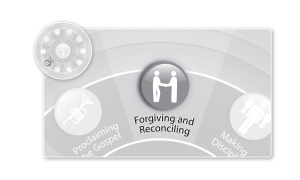 How does God define forgiveness?
How does God define forgiveness?
The original languages of Scripture are rich with meaning in this regard.
The term used most often for forgiveness in the Old Testament is the Hebrew nasa’, which means to bear, to carry, or to be taken away.
In the New Testament, there are several words in the Greek for forgiveness, including aphesis, which means release from bondage. This is the term for forgiveness that is used in Luke 3:3 to describe the mission of Jesus:
He went into all the country around the Jordan, preaching a baptism of repentance for the forgiveness [or release from bondage] of sins.
So forgiveness in the Scripture is portrayed as a release from bondage. Through his forgiveness, Christ releases us from the bondage of sin.
But here’s the really amazing part:
The way that he releases us from the bondage of sin is the only way it turns out that humans can be released from their bondage, namely, that that bondage is transferred to Christ himself. That’s the Hebrew nasa’—to bear or carry.
This is why human ways of forgiveness just don’t work. This is why forgiveness can’t be about feeling, forgetting, or willing sin to be forgotten. Sin has to go somewhere. It can’t just evaporate. It doesn’t just disappear. In order for someone to be set free from it, someone else has to bear it.
And that’s what Christ does.
As John the Baptist says in John 1:29, Christ is the lamb of God who bears the sins of the world in himself. And that’s the message throughout the Scripture, like in Isaiah 53:4-5 (NIV):
Surely he took up our infirmities
and carried our sorrows,
yet we considered him stricken by God,
smitten by him, and afflicted.
But he was pierced for our transgressions,
he was crushed for our iniquities;
the punishment that brought us peace was upon him,
and by his wounds we are healed.
Or, as Peter put it in 1 Peter 2:24 (NIV):
He himself bore our sins in his body on the tree so that we might die to sins and live for righteousness (NIV).
You may recall in the Old Testament the idea of the scapegoat, as in Leviticus 16:20-22:
“And when [Aaron] has made an end of atoning for the Holy Place and the tent of meeting and the altar, he shall present the live goat. And Aaron shall lay both his hands on the head of the live goat, and confess over it all the iniquities of the people of Israel, and all their transgressions, all their sins. And he shall put them on the head of the goat and send it away into the wilderness by the hand of a man who is in readiness. The goat shall bear all their iniquities on itself to a remote area, and he shall let the goat go free in the wilderness.”
One of the key insights we get from that passage is that sin can’t just disappear. It has to be borne by somebody, or something that, in this case, wanders around in the desert as it bears the sins of Israel.
This is why all human efforts at forgiveness ultimately fail: because humans (and goats, for that matter) can’t bear sin for very long. Sin crushes human beings—our own sin and the sin of others against us—and we cry out in protest. And we fight back. We can sometimes bear sin for a little while. We can forget about sin that’s been sinned against us for a little while. We can be loving for a while to those who have sinned against us. We can even will ourselves to bear their sin for a while. But then sin always burns through us like acid, and it always pours right back out. Only Christ can bear sin without transferring the bondage from one person (the sinner) to another (the person who the sinner sins against). If sin is not transferred to Christ, it just keeps moving around and burning new holes through new people.
Now, here is the amazing news:
Not only did Christ bear our sin; he sought to do so. It’s a non-negotiable part of his plan to set the world right. But as we’ll talk about in Part VIII, it’s the part that we fail to understand when we refuse to forgive those who sin against us.











Pingback: Here’s The Darndest Thing About Sin: When Forgiven, It Still Does Not Disappear | Rev. Eric Foley